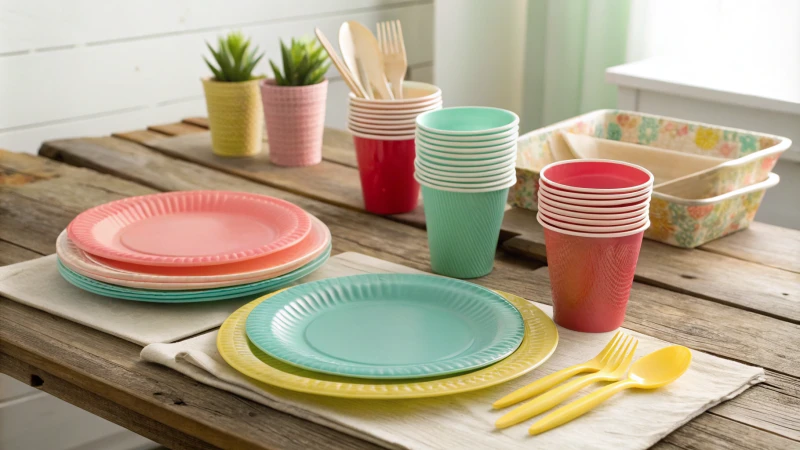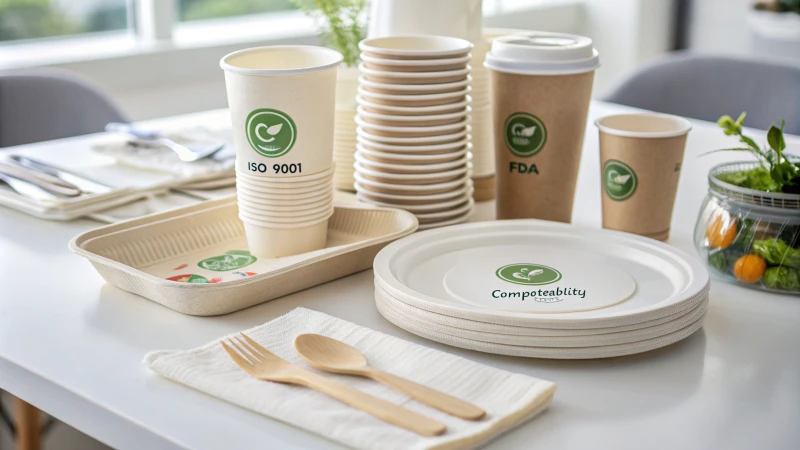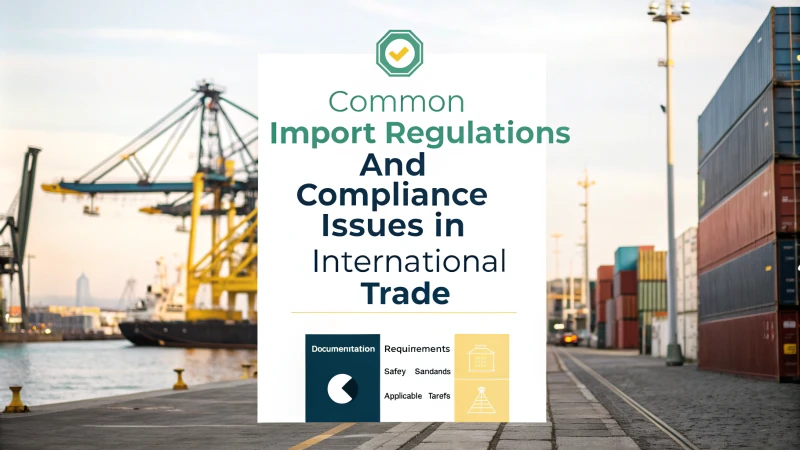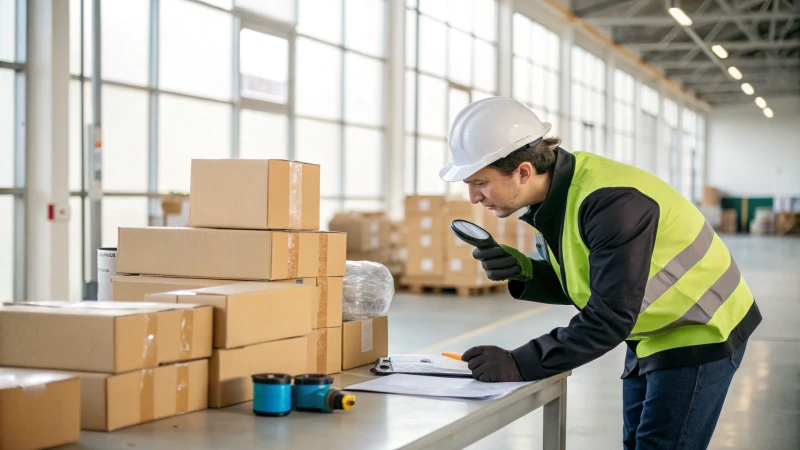
Are you looking to bring in wholesale disposable tableware from China? Let me share some tips that might guide you through this process easily!
To successfully bring in wholesale disposable tableware from China, start by researching trustworthy suppliers. These suppliers should follow the rules. Implementing good quality checks helps a lot. This guide assists you step-by-step with smart methods to lower risks. You can really simplify your import process this way.
When I first started importing, I felt very overwhelmed by all the information available. It was like standing at the edge of a huge ocean, not sure where to dive in. I gradually learned important practices that changed my experience. Research on reputable suppliers was my first step. Platforms like Alibaba and Global Sources were really helpful. I also understood the importance of knowing regulations and quality assurance. Every product met my standards. Maybe you are feeling lost. Don't worry! These insights probably guide you through the challenges of international trade.
Researching suppliers is crucial for successful imports.True
Thorough research helps identify reputable suppliers, reducing risks in the import process.
Quality assurance measures are optional when importing tableware.False
Implementing quality assurance is essential to ensure product standards and compliance.
What Are the Key Certifications Needed for Disposable Tableware?
Exploring disposable tableware might seem confusing. This is especially true with all the certifications. But don't worry! We will understand this together. You will be very informed.
**Key certifications for disposable tableware include ISO 9001 for managing quality, FDA approval for food safety and BPI and ASTM certifications for biodegradability and compostability. Local standards are also important. Understanding these helps in choosing wisely and supporting sustainability at work or home.
Understanding Certification Types
Disposable tableware needs important certifications for safety and environmental care. Here’s an easy look at these certifications꞉
ISO 9001
Manufacturers follow a quality system with this certification. It focuses on meeting customer needs and delivering regular products. This is really important when getting supplies. Learn more about ISO Standards.
FDA Approval
This approval is vital in the United States for tableware touching food. Materials used must be safe. This certification checks that. More about FDA Guidelines.
BPI Certification
The Biodegradable Products Institute (BPI) checks products for compostability, ensuring they break down in commercial composting places. BPI-certified products match sustainability goals. Find details on BPI Certification.
ASTM D6400
This standard sets rules for labeling biodegradable plastics and compostable items. It helps buyers choose wisely. Knowing these standards boosts confidence in buying decisions. More details at ASTM Standards.
Importance of Environmental Certifications
For sustainable businesses, getting certifications that highlight eco-friendliness is key. These certifications improve brand image and attract eco-conscious buyers. Consider these certifications꞉
Compliance with Local Regulations
Various regions have laws for disposable tableware. Understanding local standards is necessary for following rules꞉
US Regulations꞉ Focuses on FDA and state health rules.
EU Regulations꞉ Matches EN 13432 for compostability and rules about plastic use.
Australia꞉ Follows Australian Competition and Consumer Commission (ACCC) guidelines.
For detailed info about local regulations, speak to local regulatory groups.
Choosing the Right Suppliers
When picking suppliers for disposable tableware, check their certifications and if they follow industry rules. Verified suppliers often show their certifications clearly꞉
- Ask for certificates copies.
- Check their dedication to sustainable practices.
- Look for transparency in their sourcing and manufacturing.
For a guide on how to evaluate suppliers, explore industry standards and reviews. Finding reliable suppliers means quality products and builds trust and teamwork in sustainability goals.**

Understanding Certification Types
Understanding important certifications for disposable tableware might feel confusing. I remember my first experiences in this industry. Acronyms and standards bombarded me. It felt like learning a very new language! Each certification holds an important role. Certifications verify that the products people use are safe and eco-friendly.
When it comes to disposable tableware, several key certifications are critical for ensuring product safety and environmental responsibility. Here’s a closer look at these certifications:
-
ISO 9001: This certification ensures that the manufacturer has implemented a quality management system. It focuses on meeting customer expectations and delivering consistent products. You can learn more about ISO Standards1.
-
FDA Approval: For tableware intended for food contact, FDA approval is essential in the United States. This ensures that materials used in production are safe and compliant with health regulations. To explore more about FDA Guidelines.
-
BPI Certification: The Biodegradable Products Institute (BPI) certifies products that meet specific compostability standards, ensuring that they break down in commercial composting facilities. Check out the details on BPI Certification.
-
ASTM D6400: This standard outlines the requirements for labeling biodegradable plastics and compostable products, helping consumers make informed choices about disposable items. More information can be found at ASTM Standards.
Importance of Environmental Certifications
For businesses focused on sustainability, obtaining certifications that emphasize eco-friendliness is paramount. These certifications not only enhance brand reputation but also attract eco-conscious consumers. Here are a few certifications to consider:
| Certification | Description | Importance |
|---|---|---|
| EN 13432 | European standard for compostable packaging | Essential for selling in EU markets |
| OK Compost | Certifies products are compostable in industrial facilities | Boosts marketability in eco-friendly sectors |
| Green Seal | Certifies products based on environmental standards | Widely recognized in various industries |
Compliance with Local Regulations
Different regions have specific regulations regarding disposable tableware. Understanding these local standards is crucial for compliance:
- US Regulations: Focus on FDA and state health department regulations.
- EU Regulations: Comply with EN 13432 for compostability and other directives related to plastic use.
- Australia: Follow guidelines set by the Australian Competition and Consumer Commission (ACCC).
For detailed information about local regulations in your area, it’s advisable to consult with local regulatory bodies.
Choosing the Right Suppliers
When selecting suppliers for disposable tableware, consider asking about their certifications and compliance with industry standards. Verified suppliers typically display their certifications prominently, allowing for easy evaluation:
- Request copies of certifications.
- Evaluate their commitment to sustainability practices.
- Ensure transparency in their sourcing and manufacturing processes.
For a guide on how to evaluate suppliers, consider industry benchmarks and reviews.
ISO 9001 ensures quality management in tableware manufacturing.True
ISO 9001 certification guarantees that manufacturers adhere to quality management systems, ensuring product consistency and customer satisfaction.
FDA approval is unnecessary for disposable tableware in the US.False
FDA approval is crucial for any disposable tableware intended for food contact to ensure safety and compliance with health regulations.
How Can I Effectively Evaluate and Select Reliable Suppliers?
Locating the right suppliers feels like searching for treasure. This happens especially when quality is really important. I invite you to hear about my story in the supplier selection puzzle. My insights probably help your journey become easier and much more worthwhile.
Evaluate and select reliable suppliers by identifying vendors with a good reputation. Use platforms like Alibaba to find them. Verify certifications such as ISO 9001 to confirm their reliability. Assess product quality by requesting samples. Understand import regulations for your country. Manage logistics efficiently to avoid delays. Build long-term relationships with these suppliers. Long-term relationships matter.

1. Find Reliable Suppliers
At the start of my supplier search, the many options overwhelmed me. I learned that platforms like Alibaba, Global Sources, and Made-in-China are great resources for verified suppliers. I focused on those with excellent reviews and strong records of producing quality disposable tableware. Every time I found a possible supplier, I felt both thrilled and nervous. Would they fit well with my business?
Certifications Are Crucial
One early lesson was the value of certifications. Suppliers must have important credentials like ISO 9001 for quality management and FDA approval for food contact materials. These certifications assured me of safety compliance, providing peace during purchases. Certifications truly matter.
2. Use a Sourcing Agent
Employing a sourcing agent turned out to be a smart decision. They know the local market and helped me understand complex regulations and confirm supplier credentials. Initially, I hesitated and thought I could manage alone. Their clarity and efficiency, however, proved this partnership was worthwhile.
Advantages of Expert Help
With a sourcing agent, communication issues decreased. They often performed factory inspections and eased interactions between us and the producers. We understood each other better. This clarity was very valuable.
3. Check Product Quality
Before ordering large quantities, I always requested samples to review product quality. This step was essential since I wanted the disposable tableware to meet my standards for durability and safety. Opening each sample felt exciting, like unwrapping a gift. Would it fulfill my expectations?
Analyze Product Samples
The first sample evaluation brought feelings of hope and worry. Would they keep my brand's promises? Visiting the manufacturing site, if possible, helped immensely. Seeing production firsthand built trust with my suppliers. Firsthand visits are very helpful.
4. Learn Import Rules
Understanding import rules was another key part of my journey. Knowing local laws about food safety, labeling, and environmental standards spared me future hassles.
| Aspect | Details |
|---|---|
| Food Safety | Ensure products meet safety standards |
| Labeling | Follow local labeling requirements |
| Environmental | Adhere to eco-friendly regulations |
Being aware of tariffs and duties allowed precise budgeting for imports.
5. Manage Shipping Choices
Selecting the right shipping method was vital for maintaining both timelines and budgets.
| Shipping Options | Description |
|---|---|
| Air Freight | Faster delivery but generally more expensive |
| Sea Freight | Cost-effective for larger shipments |
I also worked closely with a customs broker to complete all paperwork correctly, which simplified customs clearance.
Proper paperwork is crucial.
6. Foster Long-Term Connections
After purchasing, maintaining open communication with suppliers strengthened partnerships. It involved more than just transactions; it encouraged mutual growth.
Open Feedback
Offering constructive feedback on product quality and service helped them improve their offerings, enriching our business relationship. This practice is key for lasting procurement.
Feedback is essential.
Following these steps - finding reliable suppliers, checking quality, understanding import rules, managing logistics well, and nurturing relationships - enabled me to choose reliable suppliers in harmony with my mission.
Reputable suppliers can be found on platforms like Alibaba.True
Utilizing platforms like Alibaba helps identify suppliers with good reviews and established track records, ensuring reliability in procurement.
Hiring a sourcing agent guarantees product quality assurance.False
While a sourcing agent aids in navigating regulations, product quality must still be assessed through sample orders and inspections, not guaranteed solely by hiring them.
What Are the Common Import Regulations and Compliance Issues?
Understanding import regulations might feel like walking through a maze. However, this path is very worthwhile. I remember my first steps in importing. The flood of rules and regulations felt overwhelming. Grasping these rules helped me avoid expensive errors. This knowledge really protected my efforts.
Important import rules include correct paperwork and following safety rules. Also, it is vital to know the tariffs and taxes that apply. Problems with following the rules often happen because of missing documents. Sometimes, goods are wrongly categorized.

Understanding Import Regulations
Import regulations differ across countries. Knowing them is crucial for anyone bringing goods into their country. In the United States, the U.S. Customs and Border Protection2 manages the importation of goods. Importers must follow various rules, including:
-
Customs Documentation: Documentation is vital. This includes bills of lading, commercial invoices, and packing lists. I often scrambled for missing invoices to clear customs!
-
Tariffs and Duties: Knowing tariff classifications for products is crucial. It determines how much duty you pay. Misclassifying an item was a big learning lesson for me!
-
Safety Standards: Products must meet safety standards for entry. For instance, food must follow FDA regulations3 to protect public health.
Common Compliance Issues
Compliance issues might happen anytime during the import process. Common challenges include poor labeling that delays shipments. I once faced this and learned to double-check everything.
| Compliance Issue | Description | Potential Consequences |
|---|---|---|
| Incomplete Documentation | Missing or incorrect documents can delay customs clearance. | Increased costs due to storage fees. |
| Non-compliance with Safety | Failing to meet safety standards can lead to product recalls or fines. | Legal repercussions and loss of trust. |
| Misclassification of Goods | Incorrectly categorizing goods can result in higher tariffs or penalties. | Unexpected financial burdens. |
| Inadequate Labeling | Products lacking proper labeling may be rejected at customs. | Wasted resources and potential fines. |
Navigating Tariffs and Duties
Tariffs and duties really impact the total cost of imports. It's wise to:
- Research Applicable Tariffs: Use the Harmonized Tariff Schedule to find duties for your products.
- Consult Customs Brokers: Customs brokers advise on tariff classifications and handle paperwork well. They have helped me many times!
- Explore Free Trade Agreements: These agreements might reduce or remove tariffs for certain goods from specific countries.
For detailed guidance on tariffs, refer to this resource on import duties4.
Best Practices for Compliance
To reduce compliance problems and manage import regulations well, try these practices:
- Stay Informed on Regulations: Regulations change often. Regularly check updates from groups like CBP5 or the FDA.
- Conduct Regular Training: Your team must understand compliance requirements through ongoing training.
- Consult Experts: Use legal experts or consultants who know international trade laws to avoid issues.
- Use Technology: Software solutions help track compliance and manage documents more efficiently.
With these practices, I've lowered risks in international imports and created a steady supply chain.
Import regulations are the same across all countries.False
This claim is false as import regulations vary significantly from country to country, requiring careful attention by importers.
Incomplete documentation can delay customs clearance.True
This claim is true; missing or incorrect documents often lead to delays in the customs process, causing increased costs.
How Can I Ensure Quality Assurance Throughout the Import Process?
Handling the import process may feel confusing. A step-by-step method helps bring order and clear understanding. Here are some important strategies that helped keep product quality high. This starts from sourcing and goes all the way to delivery.
**To keep quality high during the import process, I pick trustworthy suppliers, hire sourcing agents, do detailed quality checks, learn about import regulations, manage logistics well and maintain long-term relationships with my suppliers. These steps have been vital for importing goods successfully and sustainably.
- Identify Trustworthy Suppliers
When I started importing, I discovered that selecting the right suppliers is essential for quality assurance. Websites like Alibaba or Global Sources became very useful for finding reliable suppliers. I went through reviews and looked for proven records. It was reassuring to see positive feedback about the suppliers I considered.
Key Points꞉
- Certifications like ISO 9001 for quality management acted as my safety net.
- When dealing with food products, FDA approval was really important for safety compliance.
- Hire a Sourcing Agent
Hiring a sourcing agent transformed my quality assurance processes. These experts understand local regulations and check supplier credentials, sparing me many headaches. My sourcing agent once caught a miscommunication that could have led to an expensive error.
Benefits of a Sourcing Agent꞉
- They carry out factory audits to confirm production standards.
- They also facilitate smooth communication with the supplier, making everything easier.
-
Quality Assurance Steps
Before placing large orders, I always conduct quality assurance checks. -
Learn Import Regulations
Understanding import regulations has saved me from potential problems꞉
Compliance꞉ I always verify products meet local food safety and labeling laws.
Tariffs꞉ Knowing tariffs or duties helps me calculate total costs accurately. -
Logistics and Shipping
Good logistics management is crucial for keeping quality high during imports꞉- I select shipping methods based on my schedule and budget; air freight is fast, while sea freight might be cheaper.
- Working with a customs broker to handle paperwork is very important for smooth customs clearance.
-
Build Lasting Relationships
Keeping open communication with suppliers after buying fosters better quality assurance꞉- Giving feedback on product quality lets suppliers improve their offerings.
- Discussing future orders and pricing builds trust and leads to better terms over time.
By using these strategies, I have incorporated quality assurance throughout my import process. This proactive approach has greatly minimized risks and made my international trade journey rewarding and enjoyable.**

Quality Assurance in Importing
Quality assurance during importing goes beyond simple checks. It creates trust and lasting relationships. Reputable suppliers are very important. Managing logistics well helps minimize risks. Each step plays a crucial role in safe international trade.
Key Considerations:
- Ensure that your suppliers have established track records and positive reviews in producing high-quality products.
- Check for certifications such as ISO 9001 for quality management.
- Verify FDA approval if applicable to ensure compliance with safety standards.
1. Identify Reputable Suppliers
When importing goods, the foundation of quality assurance begins with selecting the right suppliers. Utilize platforms like Alibaba6 or Global Sources7 to find verified suppliers.
2. Engage a Sourcing Agent
Hiring a sourcing agent can significantly enhance your quality assurance processes. These professionals specialize in navigating local regulations and verifying supplier credentials, which helps in reducing risks associated with miscommunication.
Benefits of a Sourcing Agent:
- Conduct factory audits to evaluate production standards.
- Facilitate seamless communication between you and the supplier.
3. Quality Assurance Measures
Before committing to large orders, it's vital to perform quality assurance checks:
| Quality Check | Action | Purpose |
|---|---|---|
| Sample Orders | Request samples of products | Evaluate durability and safety |
| Factory Visits | Inspect production processes | Build trust and assess quality control measures |
4. Understand Import Regulations
Familiarizing yourself with import regulations is crucial to avoid issues that could affect product quality:
- Compliance: Ensure products meet local laws regarding food safety and labeling.
- Tariffs: Be aware of any tariffs or import duties that may apply, affecting overall costs.
5. Logistics and Shipping
Effective logistics management plays a vital role in maintaining quality throughout the import process:
- Choose the appropriate shipping method based on your timeline and budget; consider air freight8 for speed or sea freight for cost-effectiveness.
- Work with a customs broker to ensure all paperwork is properly filed, facilitating smooth customs clearance upon arrival.
6. Build Long-Term Relationships
Maintaining open communication with suppliers post-purchase can lead to improved quality assurance:
- Provide feedback on product quality, allowing suppliers to enhance their offerings.
- Foster trust by discussing future orders and pricing, leading to better terms down the line.
Selecting verified suppliers is crucial for quality assurance.True
Choosing reputable suppliers helps ensure high-quality products and compliance with safety standards, forming the foundation of effective quality assurance in the import process.
Engaging a sourcing agent guarantees product quality.False
While sourcing agents enhance communication and compliance, they do not guarantee product quality; thorough checks and supplier selection are still necessary.
Conclusion
Learn best practices for importing wholesale disposable tableware from China, including supplier selection, quality assurance, compliance with regulations, and effective logistics management.
-
Discover essential certifications that ensure your disposable tableware meets safety and sustainability standards. ↩
-
Learn about the essential guidelines for navigating import regulations effectively and avoid potential pitfalls in your business. ↩
-
This link offers insights into compliance issues that frequently occur in international trade, helping you prepare better. ↩
-
Find detailed information on tariffs and duties applicable to imports, crucial for budgeting your expenses. ↩
-
Explore resources on best practices for maintaining compliance in international trade, which can save you time and money. ↩
-
This link provides insights into effective supplier management techniques that can enhance product quality during imports. ↩
-
Discover best practices in logistics that can help maintain product quality during shipping and customs clearance. ↩
-
Learn about the importance of certifications and compliance in maintaining product quality during imports. ↩

